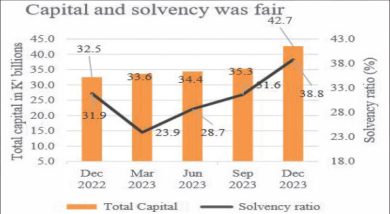Malawi’s forex reserves recover from slight decline
Malawi’s gross foreign exchange reserves —a combination of official and private sector reserves— inched upwards to 3.68 months of import last week recovering from the prior week’s slight fall.
According to Reserve Bank of Malawi’s (RBM) daily financial market report for November 29 the gross official reserves rose to $770.06 million (about K5.6 billion), equivalent to 3.68 months of import cover on November 27.

In the week before, the gross official reserves dropped to $766.45 million which is equivalent to 3.67 months of imports from $778.17 million which is equivalent to 3.72 months of import cover.
In recent months the RBM central bank has maintained a sound forex reserves position in recent months, averaging above 3 months, a situation the bank attributed to its capacity to enhance its open market operations and the disbursement of the $84.3mill ion (about K5.7 billion) World Bank budgetary support.
Along with the move, the kwacha remained broadly stable to the dollar due to what authorities have attributed to fiscal discipline and efforts by the RBM to absorb excess liquidity from the banking system as well as maintenance of positive real interest rates.
Commenting on drop of the reserves, one market analyst told Business News in an interview on Thursday the situation should not raise eyebrows saying it is just one of the normal up-and-down swings experienced in the market.
Speaking previously with Business News, RBM spokesperson Mbane Ngwira said the RBM is confident that in 2017 and at least into the foreseeable future, Malawi is not likely to experience the usual seasonal lean period in terms of foreign exchange availability, thereby cementing the current stability of the exchange rate.
Traditionally, Malawi experiences significant seasonal volatility in its foreign exchange inflows with earnings from tobacco exports concentrated during the April to August period.
On the contrary, exchange rate outlook this year differs from the previous years. This year the higher reserves are being achieved although the tobacco market performed dismally attracting only $212 million (about from the 2017 marketing season, an indication that the share or importance of tobacco as a foreign exchange earner is being overtaken by other imports.
Speaking earlier with Business News one economic analyst Cosmas Chigwe casted no doubt on the stability of the kwacha going forward pointing that it is no longer the tobacco marketing season that propels the local unit.




